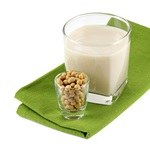12 Tips to Boost Your Calcium Intake
Various factors affect how much of the calcium you ingest really gets into your blood. Here are facts and tips you should know to boost your calcium intake in your diet or any calcium supplements you take:
1. Misleading labels on calcium supplements
The important thing to remember is the amount of elemental calcium provided by the supplement. This is the actual amount of useable calcium. The rest of the calcium in the tablet is coupled with a salt that makes it unavailable to the body.
For example:
Calcium glutamate is only 9 percent elemental calcium. A 500-milligram tablet of calcium glutamate may contain only 45 milligrams of elemental calcium, even though you were led to believe you were taking 500 milligrams of calcium. Calcium carbonate, on the other hand, is 40 percent elemental calcium; 500 milligrams of calcium carbonate would provide 200 milligrams of usable calcium.
Labels on some supplements make this distinction, listing both the type of calcium compound in the supplement and the amount of elemental calcium provided. Other products are not as carefully labeled. Read labels closely and compare several brands when you shop. (See How to Read A Package Label)
2. Stress effects calcium
When you’re stressed, the calcium in your diet is excreted rather than used.
3. Take smaller amounts more frequently and with meals
For example, your body absorbs more calcium if you take one 250 milligram tablet twice a day rather than one 500 milligram tablet once a day. If a higher dose calcium tablet is a better buy, break it in half.
4. Dairy products are a rich source of calcium
Lactose is the sugar contained in milk. However, keep in mind that chocolate milk is not a good source of calcium, because chocolate contains calcium-binding oxalates, interfering with calcium absorption.
5. Soft drinks can decrease the absorption of calcium
Soft drinks that contain citric and phosphoric acid can decrease the absorption of calcium rather than boost your calcium intake. So a 12-ounce cola may rob the body of 100 milligrams of calcium.
6. Vitamin C improves the absorption of calcium
This is why calcium-fortified orange juice makes sense
7. High-fiber diets can interfere with calcium absorption
That being said, it’s best not to mix a high-fiber meal with a high-calcium one.
8. The calcium-to-phosphorus ratio effects absorption
The ideal calcium-phosphorus ratio is 2 to 1 (close to the proportion found in human milk) which has an almost perfect calcium-to-phosphorus ratio of 2.3 to 1. The ratio in cow’s milk is 1.3 to 1. The higher the phosphorus content of the food, the more calcium is excreted in the urine, leading to a loss of calcium. Foods high in phosphorus (such as meat, poultry, corn, potatoes, beer, buckwheat) can interfere with calcium absorption.
9. Estrogen facilitates calcium absorption
This means that women who have gone through menopause are at an increased risk of calcium deficiency and therefore especially need to increase calcium intake in their diets.
10. Vegans run the risk of calcium deficiency
This theory is based on the idea that the calcium in vegetables, like iron, is bound by the fibers and phytates (mineral-building chemicals in plants) in the vegetables and may interfere with calcium absorption. The theoretical worry may be balanced out by the lower phosphate content of vegetables, which can increase calcium intake. Most people have the enzyme phytase, which breaks down the phytic acid in vegetables.
11. Lack of exercise and lack of calcium
“Couch-potatoism,” or lack of exercise, may contribute as much, or more, to osteoporosis rather than lack of calcium. Weight-bearing exercise (just about any exercise except swimming or cycling) not only builds muscle, it builds bone.
12. Ignore info about losing bone mass while breastfeeding
After weaning, breastfeeding mothers regain the bone mass they may have lost. Some even get a perk by regaining more, which has the same effect as to boost your calcium intake through diets.
Dr. Sears, or Dr. Bill as his “little patients” call him, has been advising busy parents on how to raise healthier families for over 40 years. He received his medical training at Harvard Medical School’s Children’s Hospital in Boston and The Hospital for Sick Children in Toronto, the world’s largest children’s hospital, where he was associate ward chief of the newborn intensive care unit before serving as the chief of pediatrics at Toronto Western Hospital, a teaching hospital of the University of Toronto. He has served as a professor of pediatrics at the University of Toronto, University of South Carolina, University of Southern California School of Medicine, and University of California: Irvine. As a father of 8 children, he coached Little League sports for 20 years, and together with his wife Martha has written more than 40 best-selling books and countless articles on nutrition, parenting, and healthy aging. He serves as a health consultant for magazines, TV, radio and other media, and his AskDrSears.com website is one of the most popular health and parenting sites. Dr. Sears has appeared on over 100 television programs, including 20/20, Good Morning America, Oprah, Today, The View, and Dr. Phil, and was featured on the cover of TIME Magazine in May 2012. He is noted for his science-made-simple-and-fun approach to family health.

